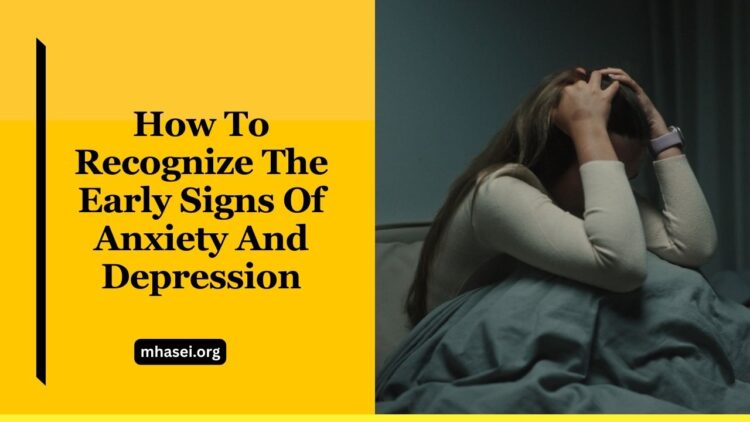Mental health is one of the most important parts of our overall well-being. Yet, many people ignore the early signs of depression and anxiety symptoms until they become very serious. Knowing these signs early can help people get support, recover faster, and prevent long-term problems.
In this guide, we will explain the most common mental health awareness tips, how to identify symptoms, and when it is the right time to seek help.
What Are Anxiety and Depression?
- Anxiety is a condition where people feel constant worry, fear, or nervousness even without a clear reason.
- Depression is when someone feels very sad, hopeless, or loses interest in activities they once enjoyed.
Both conditions affect not just the mind but also the body. If untreated, they can affect school, work, relationships, and even physical health.
Common Early Signs of Anxiety
Here are the most common anxiety symptoms that people may notice:
- Constant worry about small or daily things
- Trouble sleeping or frequent nightmares
- Feeling restless or unable to sit still
- Rapid heartbeat and sweating without reason
- Avoiding social situations due to fear
- Difficulty focusing on studies or work
Common Early Signs of Depression
The early signs of depression are often confused with normal sadness. But depression lasts longer and feels heavier. Watch out for:
- Feeling sad or empty most of the day
- Loss of interest in favorite hobbies or activities
- Changes in sleep patterns – too much or too little
- Eating much more or less than usual
- Feeling tired even after resting
- Thoughts of worthlessness or guilt
Physical Symptoms You Shouldn’t Ignore
Mental health problems often show up as physical issues. These can include:
- Headaches or stomach problems with no clear reason
- Constant tiredness or lack of energy
- Muscle tension and unexplained body pain
- Weak immune system leading to frequent illness
Difference Between Normal Stress and Anxiety/Depression
Many teenagers and adults face stress in daily life, but that doesn’t always mean they have anxiety or depression.
| Factor | Normal Stress | Anxiety/Depression |
|---|---|---|
| Duration | Short-term, goes away after problem ends | Long-lasting, weeks or months |
| Feelings | Nervous but manageable | Fear, sadness, or hopelessness that feels heavy |
| Effect on Daily Life | Can still complete tasks | Hard to study, work, or even do daily activities |
| Physical Impact | Temporary headache or fatigue | Long-term tiredness, poor sleep, constant worry |
Why Early Recognition Matters
Spotting the early signs of depression and anxiety symptoms is very important because:
- It helps people get treatment sooner.
- Reduces the risk of serious mental health breakdowns.
- Improves school, work, and social life.
- Increases awareness and reduces mental health stigma.
Steps to Take If You Notice Symptoms
If you or someone you know shows early signs:
- Talk to a trusted friend, teacher, or family member.
- Visit a doctor or mental health professional.
- Try simple methods like deep breathing, exercise, and journaling.
- Avoid isolating yourself – stay socially connected.
- Follow a proper sleep and eating routine.
When to Seek Professional Help
It is important to get professional help when:
- Symptoms last for more than two weeks.
- Daily life like school, work, or relationships is badly affected.
- Thoughts of self-harm or suicide occur.
- Nothing seems enjoyable anymore.
Mental health awareness is more important today than ever. Recognizing the early signs of depression and anxiety symptoms can save lives. Many people ignore these signals, thinking they are just stress or mood changes. But if these feelings last longer and affect daily life, it is time to get support.
Remember, asking for help is not weakness—it is strength. By understanding and spreading awareness, we can create a healthier and more supportive society for everyone.
FAQs
What are the first signs of anxiety in teenagers?
The first signs usually include constant worry, avoiding friends, restlessness, and trouble sleeping.
Can depression cause physical health problems?
Yes, depression can lead to headaches, tiredness, body pain, and even weak immunity.
How can I support a friend showing early signs of depression?
Listen without judgment, encourage them to talk to a doctor, and remind them they are not alone.




